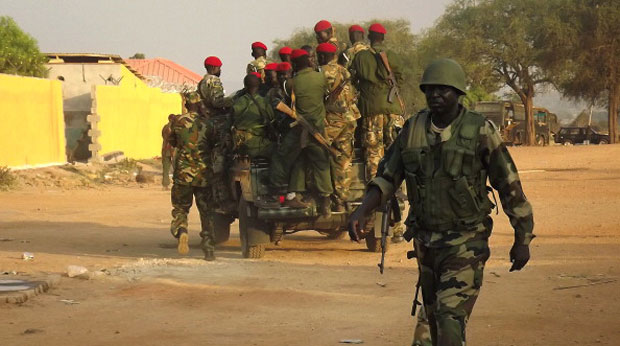South Sudan: why does Africa's newest state face civil war?
The worsening conflict in South Sudan could become a 'fully-fledged war' if no action is taken, says UN

A free daily email with the biggest news stories of the day – and the best features from TheWeek.com
You are now subscribed
Your newsletter sign-up was successful
FRESH clashes have erupted in South Sudan despite ongoing peace talks between government representatives and rebels.
Fighting began in the capital Juba in mid December but has since spread to several other cities. More than 1,000 people have been killed, and over 200,000 have been displaced by the conflict.
As clashes intensify, we examine the origin of the conflict and efforts to resolve it.
The Week
Escape your echo chamber. Get the facts behind the news, plus analysis from multiple perspectives.

Sign up for The Week's Free Newsletters
From our morning news briefing to a weekly Good News Newsletter, get the best of The Week delivered directly to your inbox.
From our morning news briefing to a weekly Good News Newsletter, get the best of The Week delivered directly to your inbox.
How did clashes start in South Sudan?
Africa’s newest state gained independence from Sudan in 2011 after decades of ethnic violence and civil war.
In July last year, President Salva Kiir dismissed several high-ranking government officials, including vice president Riek Machar, after they publicly opposed Kiir’s leadership and vowed to challenge him in the next election.
Fighting broke out between government forces and rebel soldiers loyal to Machar on the 15th December and President Salva Kiir accused Machar of attempting a coup d’état.
A free daily email with the biggest news stories of the day – and the best features from TheWeek.com
What began as a political power struggle soon divided along ethnic lines. President Kiir comes from the Dinka community and Machar from the Nuer.
The BBC reports that both sides stand accused of ethnically motivated killings.
How serious is the situation now?
According to the President of the UN Security Council, Gerard Araudsaid, the situation has the potential to become a "fully-fledged war throughout the country" between the Dinka and Nuer communities.
Al Jazeera reports that international observers are worried that the effects of yet another civil war in the region could ‘destabilise East Africa’.
The BBC describes the conflict as “army fighting against army” as many of the rebels loyal to Machar are former soldiers.
Medical charities argue that the true extent of the humanitarian crisis is hard to gauge due to a lack of access to key towns and cities.
What is being done to stop the fighting?
After several delays, peace talks between representatives from both sides began this weekend in Ethiopia’s capital Addis Ababa.
The immediate goal of the talks is agreeing on the terms of a ceasefire as well as the release of ‘political prisoners’.
However, critics argue that the talks are futile as neither side is willing to compromise on significant issues. President Kiir has told the BBC he will not contemplate a power-sharing arrangement while Machar is demanding the president’s immediate resignation.
US Secretary of State John Kerry has said "both parties need to put the interest of South Sudan above their own", if the talks are to be a success.
The UN currently has over 7,000 peacekeeping troops on the ground and further reinforcements have been requested. It has promised that it will not abandon civilians but also highlighted the difficulty in patrolling such a vast area.
-
 Sepsis ‘breakthrough’: the world’s first targeted treatment?
Sepsis ‘breakthrough’: the world’s first targeted treatment?The Explainer New drug could reverse effects of sepsis, rather than trying to treat infection with antibiotics
-
 James Van Der Beek obituary: fresh-faced Dawson’s Creek star
James Van Der Beek obituary: fresh-faced Dawson’s Creek starIn The Spotlight Van Der Beek fronted one of the most successful teen dramas of the 90s – but his Dawson fame proved a double-edged sword
-
 Is Andrew’s arrest the end for the monarchy?
Is Andrew’s arrest the end for the monarchy?Today's Big Question The King has distanced the Royal Family from his disgraced brother but a ‘fit of revolutionary disgust’ could still wipe them out
-
 Epstein files topple law CEO, roil UK government
Epstein files topple law CEO, roil UK governmentSpeed Read Peter Mandelson, Britain’s former ambassador to the US, is caught up in the scandal
-
 Iran and US prepare to meet after skirmishes
Iran and US prepare to meet after skirmishesSpeed Read The incident comes amid heightened tensions in the Middle East
-
 Israel retrieves final hostage’s body from Gaza
Israel retrieves final hostage’s body from GazaSpeed Read The 24-year-old police officer was killed during the initial Hamas attack
-
 China’s Xi targets top general in growing purge
China’s Xi targets top general in growing purgeSpeed Read Zhang Youxia is being investigated over ‘grave violations’ of the law
-
 Panama and Canada are negotiating over a crucial copper mine
Panama and Canada are negotiating over a crucial copper mineIn the Spotlight Panama is set to make a final decision on the mine this summer
-
 Why Greenland’s natural resources are nearly impossible to mine
Why Greenland’s natural resources are nearly impossible to mineThe Explainer The country’s natural landscape makes the task extremely difficult
-
 Iran cuts internet as protests escalate
Iran cuts internet as protests escalateSpeed Reada Government buildings across the country have been set on fire
-
 US nabs ‘shadow’ tanker claimed by Russia
US nabs ‘shadow’ tanker claimed by RussiaSpeed Read The ship was one of two vessels seized by the US military